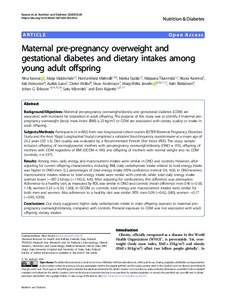Maternal pre-pregnancy overweight and gestational diabetes and dietary intakes among young adult offspring
Nina Kaseva; Marja Vääräsmäki; Hanna-Maria Matinolli; Marika Sipola; Marjaana Tikanmäki; Noora Kanerva; Kati Heinonen; Aulikki Lano; Dieter Wolke; Sture Andersson; Marjo-Riitta Järvelin; Katri Räikkönen; Johan G Eriksson; Satu Männistö; Eero Kajantie
https://urn.fi/URN:NBN:fi-fe2021042821069
Tiivistelmä
Background/objectives:
Maternal pre-pregnancy overweight/obesity and gestational diabetes
(GDM) are associated with increased fat deposition in adult offspring.
The purpose of this study was to identify if maternal pre-pregnancy
overweight (body mass index (BMI) ≥ 25 kg/m2) or GDM are associated with dietary quality or intake in adult offspring.
Subjects/methods:
Participants (n = 882) from two longitudinal cohort studies (ESTER
Maternal Pregnancy Disorders Study and the Arvo Ylppö Longitudinal
Study) completed a validated food-frequency questionnaire at a mean age
of 24.2 years (SD 1.3). Diet quality was evaluated by a Recommended
Finnish Diet Index (RDI). The study sample included offspring of
normoglycaemic mothers with pre-pregnancy overweight/obesity (ONO =
155), offspring of mothers with GDM regardless of BMI (OGDM = 190) and
offspring of mothers with normal weight and no GDM (controls; n = 537).
Results:
Among men, daily energy and macronutrient intakes were similar in
ONO and controls. However, after adjusting for current offspring
characteristics, including BMI, daily carbohydrate intake relative to
total energy intake was higher in ONO-men [2.2 percentages of total
energy intake (95% confidence interval 0.4, 4.0)]. In ONO-women,
macronutrient intakes relative to total energy intake were similar with
controls, while total daily energy intake seemed lower [-587.2 kJ/day
(-1192.0, 4.4)]. After adjusting for confounders, this difference was
attenuated. Adherence to a healthy diet, as measured by RDI, was similar
in ONO and controls [mean difference: men 0.40 (-0.38, 1.18); women
0.25 (-0.50, 1.00)]. In OGDM vs. controls, total energy and
macronutrient intakes were similar for both men and women. Also
adherence to a healthy diet was similar [RDI: men 0.09 (-0.62, 0.80);
women -0.17 (-0.93, 0.59)].
Conclusions:
Our study suggested higher daily carbohydrate intake in male
offspring exposed to maternal pre-pregnancy overweight/obesity, compared
with controls. Prenatal exposure to GDM was not associated with adult
offspring dietary intakes.
Kokoelmat
- Rinnakkaistallenteet [27094]
